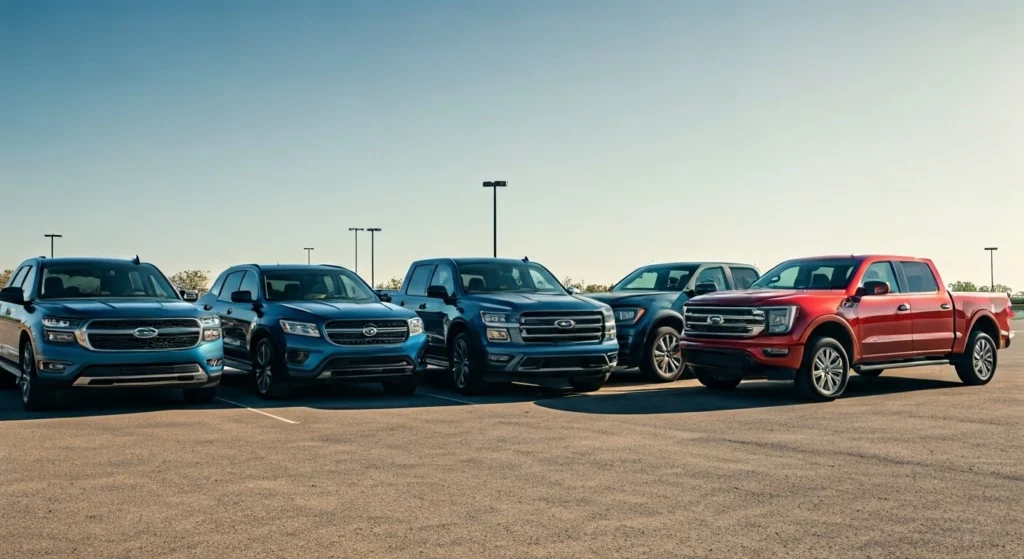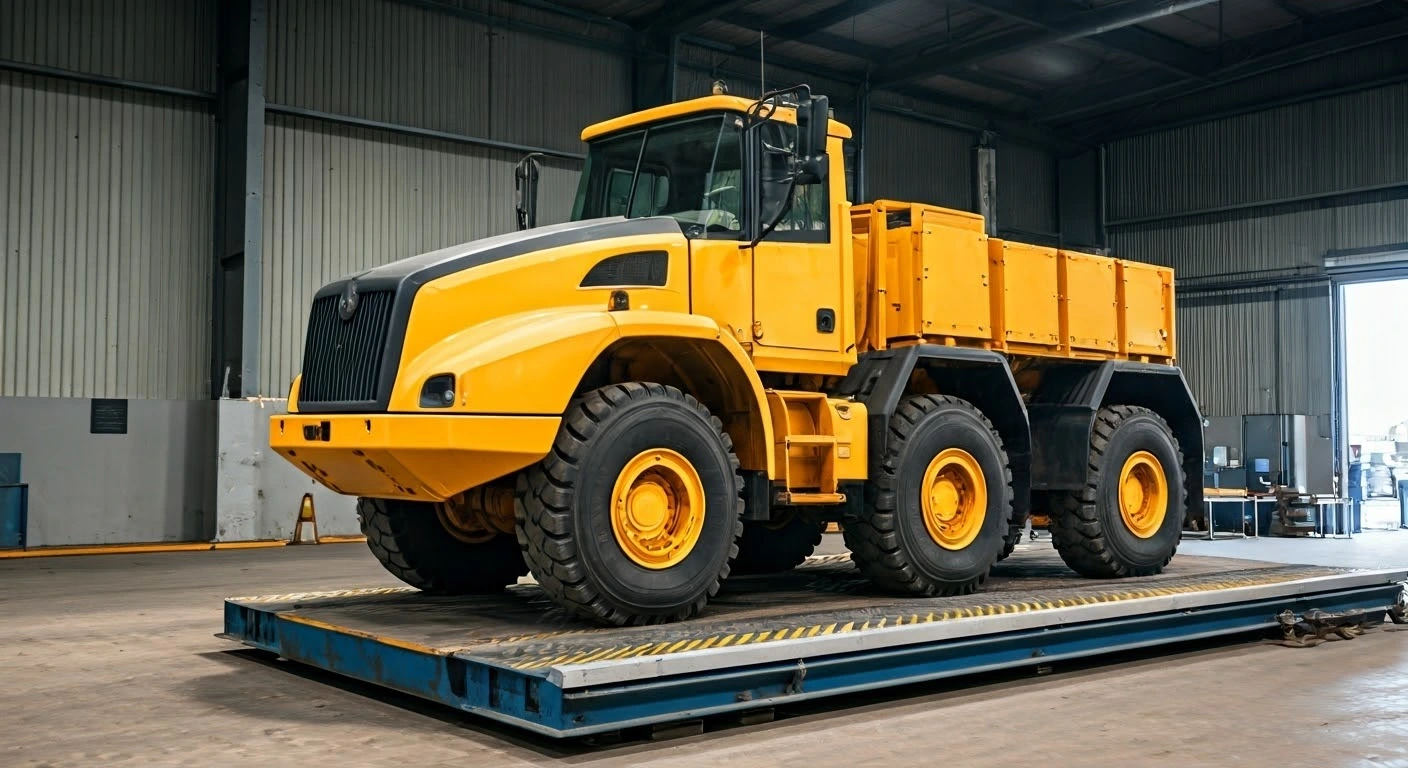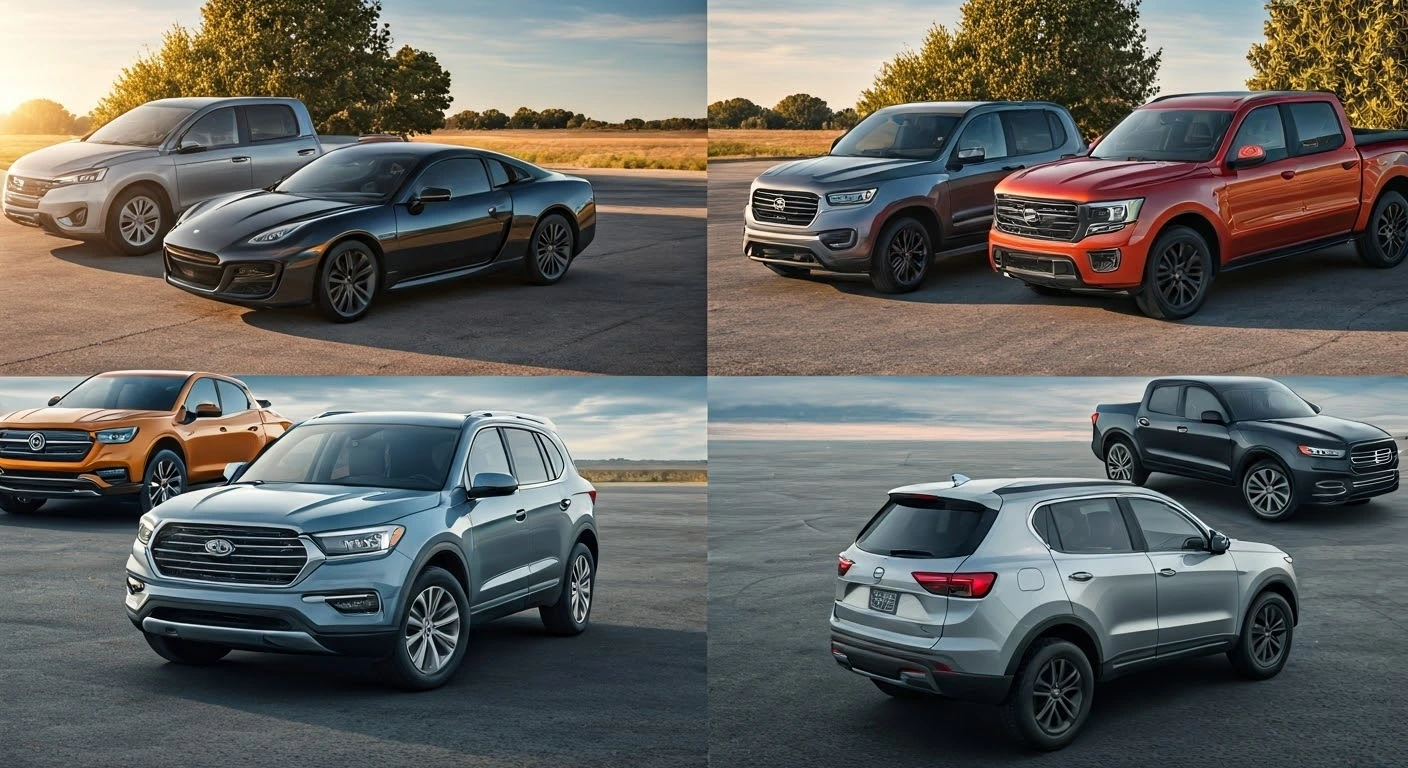The Ultimate Section 179 Guide: Unlock Maximum Tax Deductions with the List of Eligible Vehicles

Are you thinking about getting a strong vehicle for your business this year? IRS Section 179 deduction can help you save money. It allows businesses to deduct a large part of the purchase price of certain eligible vehicles used for business. Many vehicles can qualify, but you need to know which ones do by checking their weight. Often, vehicles over 6,000 lbs like trucks, SUVs, and some luxury cars qualify for tax deductions. By knowing the IRS Section 179 deduction vehicles list 2024 you can take full advantage of potential tax savings, especially
Understanding which vehicles are eligible for the Section 179 tax deduction can help you make an informed decision when adding a vehicle to your fleet, whether you’re looking to purchase cars, trucks, SUVs, or any vehicle over 6000 lbs. This can be particularly beneficial if your business requires a heavy-load vehicle for transportation, delivery, or other operational needs.
Key Takeaways
- Section 179 offers a business vehicle tax deduction, allowing businesses a big tax write off for buying certain vehicles in the first year.
- Heavy load transport vehicle including SUVs, pickup trucks, and vans used for business purposes can qualify for this deduction.
- The gross vehicle weight rating (GVWR) matters a lot. In 2024, vehicles weighing between 6,000 and 14,000 lbs can deduct up to $30,500. If a vehicle weighs over 14,000 lbs, there is no limit on deductions.
- You can improve your tax benefits by using Section 179, alongwith bonus depreciation.
- It’s vital to keep good records. This includes your purchase date, mileage logs, and proof of business use.
Need an expert to handle your taxes?
Visit ForMyTax for taxation services and more!
Essential Criteria for Vehicles to Qualify

Not all vehicles on the road can qualify for the Section 179 deduction. A vehicle must follow specific rules from the IRS to be eligible for this deduction. Let us check these out in more detail.
Determining the Business Usage Percentage
To best use your Section 179 tax deduction, you need to know how much you use your vehicle for business. You can find this percentage by dividing the miles you drive for work by the total miles you drive in that tax year.
Keeping clear records of your mileage is important for proving your business use. You can use a logbook or a mileage-tracking app to keep a list of your trips. Note the date, the reason for the trip, your starting and ending mileage, and the total miles you drove.
Also, hold on to all your receipts for vehicle costs. This includes things like fuel, maintenance, and insurance. These receipts can help you when claiming business use. Keeping clear records will help you stick to IRS rules and boost your tax savings.
Understanding Gross Vehicle Weight Rating (GVWR) Requirements
To save on taxes using the Section 179 Deduction, you need to understand the Gross Vehicle Weight Rating (GVWR) rules. The GVWR tells you if a vehicle can qualify for the deduction based on how much it weighs. Over 6,000 lbs vehicles can receive significant tax benefits. If you own a business, this is something to think about when picking vehicles for business use.
Purchase Date and In-Service Deadline Considerations
The timing for buying your vehicle matters a lot if you want to get the Section 179 deduction. You must buy and start using the vehicle in the same calendar year. This means you must make the purchase and use it for business in the same tax year.
If you buy a qualifying vehicle in December but begin using it for business in January of the following year, you cannot take the Section 179 deduction for the first year of use.
What is the Section 179 Vehicles List That May Be Eligible for Deduction?

A range of business vehicles can qualify for this deduction. Here are some popular vehicles weighing over 6,000 lbs GVWR.
#1 Pickup Trucks Over 6000 lbs
Pickup trucks are strong and tough. These trucks can be useful if your business has to move equipment or materials.
Choose a pickup truck over 6,000 lbs. This matters for the Section 179 rules. Good examples include the Ford F-250 and the Chevrolet Silverado 2500. These trucks are tough and made to last. They are also great at towing heavy loads.
#2 Cargo Vans Meeting Specific Gross Vehicle Weight Ratings
Cargo vans are a smart choice for businesses that carry goods and equipment. These vans are big and offer a lot of space.
You must make sure the van meets the weight requirements to qualify for the Section 179 deduction. Vans like the Mercedes-Benz Sprinter and Ford Transit usually have over 6,000 lbs GVWR choices
#3 Passenger Vans That Can Seat 9+ Passengers Behind the Driver’s Seat
Transporting teams, clients, or large groups is easy with passenger vans. These roomy vehicles have lots of seats. They are a good choice for businesses, especially in hospitality and tourism.
In order to qualify for Section 179 passenger vans usually need to hold nine or more people seated behind the driver. You can check this information on the driver’s side door label.
#4 SUVs Over 6000 lbs but Less Than 14000 lbs
SUVs are popular because they are useful and built tough. They are good for businesses that need practicality and can get tax benefits through Section 179. Heavy SUVs provide a nice mix of comfort for passengers and space for carrying things.
When you see an SUV, check its GVWR for business tax deduction. This will tell you if it can get a Section 179 deduction. Heavy SUVs, like some Chevrolet Suburban or Ford Expedition models, usually weigh more than 6,000 lbs. These may qualify for the deduction.
#5 Luxury Vehicles over 6000 Pounds
Luxury vehicles over 6000 lbs can get the Section 179 deduction if they are used for business purposes. This tax benefit allows business owners to deduct a big part of the vehicle’s purchase price in the first year.
To summarize, many vehicles can hit the 6,000 lbs GVWR limit required for Section 179 eligibility. But this is just one factor to keep in mind for qualification. You should always look at the specific model and its setup. The GVWR can vary based on trim levels, engine options, and additional features. Here are some popular heavy-duty vehicles including cars over 6000 pounds from the section 179 tax deductible vehicles list.
Category | Make | Model |
Pickup Trucks | Ford | F-250, F-350 |
| Chevrolet | Silverado 2500, 3500 |
| Ram | 2500, 3500 |
| Tesla | Cybertruck |
| Hummer | EV |
SUVs | Chevrolet | Suburban |
| Ford | Expedition |
| GMC | Yukon XL |
| Cadillac | Escalade |
Cargo Vans | Mercedes-Benz | Sprinter |
| Ford | Transit |
| Ram | ProMaster |
Click here for a comprehensive list of eligible vehicles over 6000 lbs for 2024.
Strategies to Maximize Your Section 179 Deduction
You should plan carefully and know the tax code to get the most from your Section 179 deduction. A helpful tip is to buy several qualifying vehicles in the same tax year if your business can pay for them. This will boost your deduction amount and lower your tax liability.
Also, use bonus depreciation when you can. Section 179 helps cut your taxable income dollar-for-dollar. At the same time, bonus depreciation lets you take away a bigger part of the vehicle’s cost right away. This helps you save more on taxes quickly.
Timing Your Vehicle Purchases for Optimal Benefits
To get the best tax benefits, think about buying your vehicle near the end of your tax year. This way, you can claim depreciation for a longer time.
Remember, tax laws can change. It is wise to talk to a tax professional. They can help you know your options. They can also advise you on the best time to purchase for better tax savings.
Combining with Bonus Depreciation
To make the most of your vehicle purchase deductions, you should use Section 179 and bonus depreciation. These tax benefits can lower your tax bill a lot.
Start with your Section 179 deduction. This helps reduce your taxable income immediately. After you reach the deduction limit, you can use bonus depreciation to cover any leftover cost of the vehicle.
The bonus depreciation rate can change because of different laws and the age of the vehicle. Still, it can give you good deductions. If you use these options, you can save more money and lower your tax burden.
2024 Section 179 Tax Deductions for Startups and Small Business Owners
As a startup or small business, if you plan to invest in heavy vehicles, you can benefit from Section 179. This rule allows qualified businesses to deduct a large part of the purchase price from their taxable income.
This tax incentive is helpful for businesses that are just starting. Cash flow is very important during these early years. This benefit helps them save money. They can use that money to grow in different ways. This could be the key to making a profit instead of losing money for startups.
When you intend to buy vehicles in 2024, it’s a good idea to consult a tax expert. They can help you learn how to take advantage of Section 179. This guidance can ensure your small business receives all the benefits of this helpful tax break.
Consulting with a Tax Professional for Tailored Advice

Tax laws can be complicated and often change. This is why it’s good to work with an expert. A tax professional can assist you with your business’s unique needs. They will ensure that you take advantage of all available deductions and follow IRS rules.
A tax expert can help you see if you can use Section 179 and bonus depreciation.
As the year ends, it’s a good time for businesses to look at their tax situation. If you are thinking about buying a heavy vehicle, this is the perfect time. Section 179 offers significant tax savings, making it more attractive as the year ends.
Talk to your tax advisor for year-end planning. They can help you figure out if buying a vehicle before December 31 is good for your tax plans. Look at your income for this year. Think about possible deductions and your tax liability for next year.
Getting help from experts early is very important. It can save you a lot of time. It can also help you avoid making mistakes. This can make your business’s finances better. Additionally, they can answer all your questions. This professional can be a good partner in managing your tax planning.
For expert assistance with your taxes, look no further than ForMyTax. Our team is here to help you maximize your deductions and more!
Avoiding Common Pitfalls in Claiming Section 179 Deduction
When you use the Section 179 deduction, business owners can make mistakes. To avoid these issues, keep detailed records of your vehicle. Be sure to note the purchase date, the price, and how much you use it for business.
Next, make sure the vehicle’s Gross Vehicle Weight Rating (GVWR) follows the rules for deduction. If you think a vehicle is qualified without checking its details, it could cause problems later. Also, remember the benefits of bonus depreciation.
Misinterpreting Business Use Percentage Calculation
To make the most of your Section 179 deduction, it’s important to accurately calculate how much you use your vehicle for business. A common mistake is not fully understanding or undervaluing your business use. This error can lead to lower tax savings.
To avoid this problem, you need to watch your mileage during the year. It’s important to separate your business and personal use. You can use tracking apps, keep a logbook, or even use GPS systems to help you keep accurate records.
If you think your business use is quite high, keep in mind that the IRS might look at your situation more closely. This could result in penalties. It is crucial to be honest and accurate with your numbers.
Overlooking Bonus Depreciation Opportunities
Many businesses focus only on the Section 179 deduction. They sometimes forget about the tax benefits of bonus depreciation. Bonus depreciation lets you take off a big part of the cost of a new or used vehicle right away. This works even if you meet your yearly spending limit. It’s a smart way to lower your tax liability.
Not using bonus depreciation and Section 179 together can lead to missing out on big tax savings. This is especially true if you have expensive vehicles.
Overlooking Documentation and Record-Keeping Requirements
Inadequate documentation is a common error that can damage your Section 179 deduction claim. The IRS needs clear and detailed records. These records show your expenses and support your claim for business use.
- Keep good records of your vehicle purchase agreement, registration, and insurance.
- Track your mileage logs and other business expenses.
- This paperwork proves that your deduction is real. It can help you in audits.
- Create a system to keep your records safe, whether they are digital or paper. This will help you find them easily.
- It will also help you follow IRS rules.
Conclusion
Knowing the rules for Section 179 deductions is vital. This information helps businesses make the most of their tax benefits. Companies can save more money by timing their purchase of vehicles over 6000 GVWR and using Section 179 along with bonus depreciation. It’s wise to consult tax experts for tailored advice. Keeping accurate records is important to prevent errors. Also, understanding how Section 179 deductions can influence business growth is crucial.
How can ForMyTax help?
Navigating the Section 179 deduction for vehicles over 6,000 lbs can be tricky. ForMyTax is here to help you. We want to make it easier to understand and get the most from your tax benefits. Our team knows a lot about vehicle deductions and can guide you step by step through the process.
We can help you find out if you qualify, look into your business use percentage, and gather the documents you need. This way, you will feel sure and supported during this process. Trust ForMyTax to be by your side. Together, we can unlock your vehicle deduction potential and save you more money.
Frequently Asked Questions
Section 179 lets businesses take off the cost of certain things from their taxable income. It covers heavy vehicles, computers, and machines used mainly for business activities.
The downside of the Section 179 deduction is that it can lower your assets' value. This might lead to a higher tax burden in future years.
You may not be able to write off the full purchase price of a 6,000 lb vehicle. The amount you can deduct depends on several things. This includes the vehicle's Gross Vehicle Weight Rating (GVWR) and the guidelines given by the IRS.
Heavy vehicles, like trucks and SUVs used for business, may qualify for the Section 179 deduction if they meet a certain Gross Vehicle Weight Rating (GVWR).
Section 179 is a type of federal tax deduction. However, some states have their own tax rules. A few states may not fully follow Section 179. It is important to check the tax laws in your area to ensure you are following them.
Knowing the deadline is important for businesses looking to claim the Section 179 deduction for vehicles in 2024. The IRS says you must start using the vehicle for business by the end of the tax year you want to claim it.
If you plan to use Section 179 for a vehicle you buy in 2024, you must start using it for your business by December 31, 2024. If you purchase the vehicle in late December and don't use it, you cannot claim it for the 2024 tax year.
The Section 179 deduction can help you save money when you buy equipment and vehicles for your business. However, you need to know its limits. A major limit is the yearly cap set by the IRS. In 2024, the maximum amount you can deduct is $1,160,000.
Your deduction can't be more than your taxable income for the year. If your business income is less than the limit for deductions, you can only deduct what you earned.
The amount you can deduct for passenger vehicles, like SUVs and trucks, has limits. Knowing these limits will help you handle your finances better. It will also help you maximize your deductions without exceeding the allowed amounts.
Yes, both new and used vehicles can qualify for the Section 179 deduction if they are used for business purposes. Leased vehicles over 6000 pounds may also qualify under certain conditions if they are used more than 50% for business use. It's important to keep detailed records and ensure compliance with IRS regulations when claiming these deductions.
Not all vehicles over 6000 lbs qualify. The vehicle must be used for business purposes more than 50% of the time to be eligible for the full deduction under Section 179.
FORMYTAX.COM
Providing quick and personalized support is our mission. Our U.S. based support team is committed to providing excellent service in every time zone. We're always willing to help!
SUPPORT
- support@formytax.com
- (888) 808-4641
-
2400 Barranca Pky, Irvine, CA 92606
14341 Clark Avenue, Bellflower, CA 90706.
